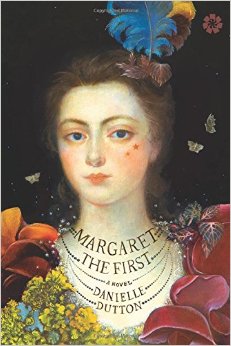
The reason I know anything at all about Mad Madge, aka Margaret Cavendish, Duchess of Newcastle, is entirely coincidental: she features heavily in (and supplies the title of) Siri Hustvedt’s excellent novel The Blazing World, which I happen to have read. In the 17th century, she was that rare and stunted unicorn, a female writer demanding to be taken seriously. Why is she so little-known when her contemporaries and near-contemporaries – Samuel Pepys, Thomas Hobbes, and Rene Descartes, to name a few – are bywords? (In fairness, I believe Pepys’s diaries do refer to her, though not with approval.) This fictionalised biography attempts to go some way towards remedying that gap.
Margaret Cavendish spent much of her life in forced exile from her native England, due to the dangers of the civil war (in which a number of her family members were killed). This novel recounts both her travels and her inner, intellectual life. Although the second is obviously the more significant to the author, she also takes the unusual step of contemplating the relationship between those two worlds – outer and inner – and accepting the effect that landscape and environment can have on creative output; a notion traditionally denied in the masculine model of creativity, which tends to place inspiration in a vacuum (presumably because details like childcare and household management were someone else’s problem and men were permitted the fiction of a neutral environment). For instance, during her period in Antwerp, the novel notes the winter changing to spring thaw while Margaret writes:
“At dinner one night Mr Evelyn reported seeing a crow’s feet frozen to its prey. I stared at him as if confused by what he’d said. I wrote: ‘Some Ground, though it be Barren by Nature…’ and fish froze unmoving in the Scheldt. Sitting close to the fire one night, I burned the hem of a dress, white lace curled black upon the tiles. I wrote: ‘Some Ground, though it be Barren by Nature…’ and stamped the flames with a moldy copy of Dodoens’s Historie of Plants in Antwerp. I wrote: ‘Some Ground, though it be Barren by Nature, yet, being well muck’d and well manur’d…’ Then Antwerp was flooded by melting ice. I wrote: ‘Some Ground, though it be Barren by Nature, yet, being well muck’d and well manur’d…’ Peasants filled the city. Cows floated off. Birds sang. Fish swam. I wrote: ‘Some Ground, though it be Barren by Nature, yet, being well muck’d and well manur’d, may be plentifull Crops, and sprout forth divers sorts of Flowers.'”
Well, that’s an overt example, but the same theme emerges throughout the book in less obvious ways. This idea is one that seems to have roots in the writings of Margaret herself, who devoured the writings of astronomers and natural historians, and dreamed of fantastical worlds within worlds, striving to understand the interconnectedness of objects and ideas that science, in the 17th century, was beginning to put names to.
Many will no doubt be irritated by Margaret’s largely unexamined privilege: I suspect there were very few 17th century women who maintained both barrenness and husbands supportive of their desire for publication and intellectual life. (The novel does recount a couple of tiffs between William and Margaret, but for the most part he’s as much a feminist ally as you could hope to meet in a time when women might as well not have existed above the uterus-line.) However, the fact is that she did exist and publish numerous works in a time when only extreme privilege could have made that possible. Much as I disbelieve in a Sheryl Sandberg-type trickle-down feminism, all movements have to start somewhere.
As always with historical novels, I spent a lot of time wondering how much was based on “fact” (ironic quotation marks for all you historians) and how much was speculation. In the end I suppose it’s necessary to accept the book as a novel on its face and not poke too much at the facade; and as a novel, it has a lot to recommend it. I’m not sure I always understood the reasoning behind the jumps from first- to third-person narration, though this seems a minor quibble. The writing is engaging, often beautiful; on occasion I found myself re-reading sentences several times just to re-experience them. I’ll finish with an example of one, taken from a chapter when William, though in debt, has just purchased telescopes after some fashionable discussions about astronomy: “Thus as a family – frustrated, gassy, impotent, poor – we wondered together at the turning of the stars.”